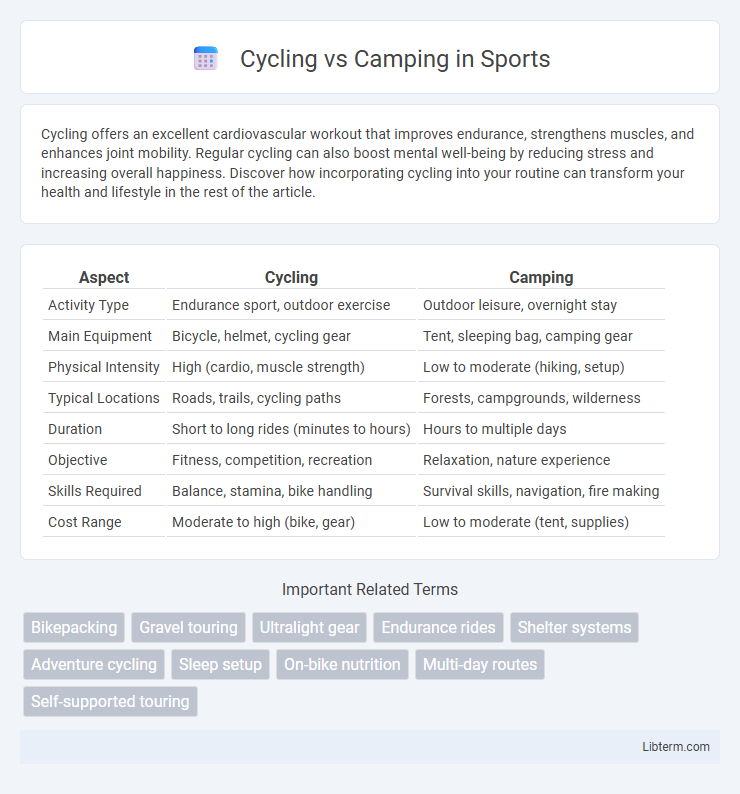Cycling offers an excellent cardiovascular workout that improves endurance, strengthens muscles, and enhances joint mobility. Regular cycling can also boost mental well-being by reducing stress and increasing overall happiness. Discover how incorporating cycling into your routine can transform your health and lifestyle in the rest of the article.
Table of Comparison
| Aspect | Cycling | Camping |
|---|---|---|
| Activity Type | Endurance sport, outdoor exercise | Outdoor leisure, overnight stay |
| Main Equipment | Bicycle, helmet, cycling gear | Tent, sleeping bag, camping gear |
| Physical Intensity | High (cardio, muscle strength) | Low to moderate (hiking, setup) |
| Typical Locations | Roads, trails, cycling paths | Forests, campgrounds, wilderness |
| Duration | Short to long rides (minutes to hours) | Hours to multiple days |
| Objective | Fitness, competition, recreation | Relaxation, nature experience |
| Skills Required | Balance, stamina, bike handling | Survival skills, navigation, fire making |
| Cost Range | Moderate to high (bike, gear) | Low to moderate (tent, supplies) |
Introduction to Cycling and Camping
Cycling offers a dynamic way to explore outdoor environments, combining physical exercise with the thrill of navigating diverse terrains on a bike. Camping provides an immersive experience in nature, allowing individuals to disconnect from urban life and engage in activities like hiking, fishing, and campfire gatherings. Both activities promote health, adventure, and a deeper connection with the natural world, appealing to outdoor enthusiasts seeking versatile recreational options.
Health Benefits: Cycling vs. Camping
Cycling enhances cardiovascular health by improving heart function, boosting lung capacity, and increasing overall stamina through sustained aerobic exercise. Camping promotes mental well-being by reducing stress, improving mood, and fostering relaxation in natural environments, while also encouraging moderate physical activity like hiking and setting up camp. Both activities contribute to physical fitness and mental health but target different aspects of wellness: cycling emphasizes cardiovascular endurance, whereas camping supports stress relief and holistic rejuvenation.
Gear and Equipment Comparison
Cycling gear primarily includes a lightweight helmet, padded cycling shorts, and a high-performance bike designed for speed and efficiency, while camping equipment emphasizes sturdy tents, sleeping bags, and portable cooking tools for comfort and survival outdoors. Cyclists often carry compact repair kits, hydration packs, and reflective clothing, whereas campers prioritize durable backpacks, lanterns, and multi-tools for extended stays in nature. The specialized nature of each activity's gear highlights cycling's focus on mobility and endurance against camping's emphasis on shelter and self-sufficiency.
Environmental Impact of Each Activity
Cycling generates significantly lower carbon emissions compared to camping, especially when camping involves the use of motorized vehicles or disposable products. The minimal energy consumption and zero-emission nature of cycling contribute to a reduced ecological footprint, preserving air quality and reducing greenhouse gas output. Camping, while promoting outdoor engagement, often leads to habitat disruption and waste generation, making sustainable practices essential for minimizing environmental impact.
Cost Analysis: Which Is More Budget-Friendly?
Cycling generally proves more budget-friendly due to lower initial equipment costs and maintenance expenses compared to camping, which requires purchasing tents, cooking gear, and often costly campsite fees. While both activities involve travel and potential gear investments, cycling benefits from minimal accommodation costs, especially when combined with day trips. Long-term, cyclists can reduce expenses through gear durability and self-powered transport, making cycling a more economical choice overall.
Social Aspects: Solo vs. Group Experiences
Cycling offers both solitude and camaraderie, as solo rides provide personal reflection and group cycling fosters social bonding and teamwork. Camping inherently encourages group interaction through shared activities like storytelling, cooking, and campfire gatherings, enhancing interpersonal connections. While solo camping deepens self-reliance and introspection, group camping amplifies social engagement and collective memory-making.
Accessibility and Locations
Cycling offers accessibility to diverse terrains including urban paths, rural roads, and mountainous regions, providing greater flexibility in exploration and ease of reaching remote locations. Camping locations often require transport to specific sites such as national parks, forests, or designated campgrounds, which may limit spontaneous travel but ensures amenities and safety. Combining cycling with camping enables access to secluded natural areas unreachable by vehicles, enhancing the adventure for outdoor enthusiasts seeking both mobility and comfort.
Adventure and Skill Development
Cycling enhances endurance, balance, and navigation skills, fostering a sense of adventure through exploring diverse terrains and challenging routes. Camping develops survival skills, such as shelter-building, fire-making, and resource management, while encouraging self-reliance in natural settings. Combining cycling and camping amplifies problem-solving abilities and adaptability, creating a comprehensive outdoor experience that sharpens both physical and mental skills.
Safety Considerations in Cycling and Camping
Safety considerations in cycling include wearing helmets certified by CPSC or Snell, using reflective gear for visibility, and maintaining bicycles with regular brake and tire checks to prevent accidents. Camping safety emphasizes selecting safe sites away from wildlife, storing food securely to avoid animal attraction, and using fire safely by keeping water or an extinguisher nearby to manage campfires. Both activities require preparation for weather changes and carrying first aid kits to handle injuries promptly in remote areas.
Choosing the Right Activity for You
Choosing between cycling and camping depends on your preference for physical activity or outdoor relaxation. Cycling offers cardiovascular benefits and exploration of diverse terrains, ideal for fitness enthusiasts seeking adventure. Camping provides immersion in nature and tranquility, perfect for those wanting a peaceful escape with opportunities for hiking and wildlife observation.
Cycling Infographic

 libterm.com
libterm.com